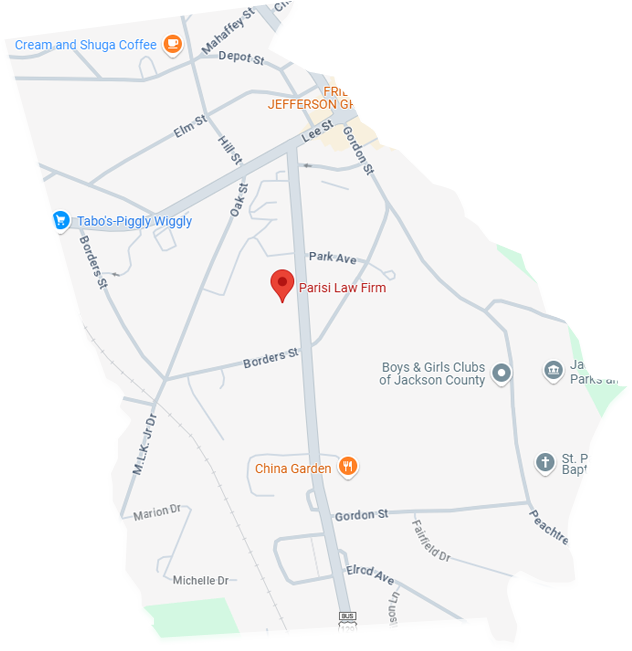In the blink of an eye, a typical day can turn into a nightmare with disruptions that just keep coming. If you’ve been seriously injured or lost a loved one to a moment of negligence from another driver, you may be wondering how a car accident settlement is determined.
No one expects a car accident, but the truth is they’re shockingly common. The Georgia Department of Health points out that automobile accidents are the leading cause of injury-related deaths and the second-leading cause of hospitalizations and emergency room visits in the state. Georgia also saw itself meet the alarming statistic of having the fourth-highest number of car accident fatalities in the country, a number that outpaces its relative population.
The reality is that a car accident has the potential to seriously disrupt our lives. If it does, getting a substantial car accident settlement is one way to start putting the pieces back together.
Is Georgia a “Fault” State?
First, it’s important to know that Georgia is a “fault” state when it comes to car accidents. This means that drivers can be held financially responsible for any damages they cause while driving. It also means that those injured in car accidents have options available when they’re injured:
- Seek compensation from your insurance company: Depending on the details of your coverage, you may be able to seek compensation for your injuries from your own insurance company. This can be especially useful if you have uninsured driver coverage and the at-fault driver did not carry the mandated insurance policies. Your insurance company, then, has the option of going after the driver for compensation directly or through their insurance company.
- Seek compensation directly from the driver’s insurance company: If the driver carries insurance and is found to be at fault, you have the option of seeking damages directly from their insurance company.
- File a personal injury lawsuit: If efforts to work directly with the insurance companies are falling short of your needs, you have the option of filing a personal injury lawsuit and suing the at-fault driver in civil court.
How Will Damages Be Calculated in a Car Accident Settlement?
“Damages” is the term used to refer to the collective impact of the harms and losses suffered as a result of the car accident. Typically, damages will include the following considerations:
- Medical expenses: Ambulance bills, the ER visit, any resulting surgeries, ongoing physical therapy, and the cost of medications can all be part of damages.
- Lost wages: If you’ve been injured seriously enough to miss work, the wages you’ve lost may be part of your settlement.
- Pain and suffering: If you are seriously injured, you may have lifelong impairments or long-term pain that can be part of your compensation.
- Wrongful death: If someone was killed in the accident, a wrongful death claim may be part of the lawsuit.
- Property damage: Often, a car accident results in damage to the vehicle of the driver who was not at fault. This is part of your damages, but it is often handled separately.
The total amount of these damages can be substantial. Some losses are straightforward. Medical bills and lost wages, for example, typically have documentation. Pain and suffering and wrongful death, however, can make things more complicated. It can be difficult to receive a settlement offer from an insurance company that adequately addresses these life-altering realities.
How Is Pain and Suffering Factored Into My Settlement?
Because pain and suffering, mental anguish, and emotional trauma are subjective, they are harder to calculate. While it is relatively easy to add up your economic losses from your medical bills, car repairs, and lost wages, it is hard to quantify how high your suffering should be valued. For this reason, two common formulas exist:
- Multiplier formula: Multiplying the total economic losses by a number between 1.5 and 5, with 1.5 being used for minor injury accidents and 5 being used for serious or permanent injury accidents
- Per diem formula: Estimating the victim’s daily income and applying that value for each day of recovery from the accident
After calculating your non-economic losses, your economic and non-economic damages will be combined to create your total car accident settlement.
In rare cases, punitive damages may also be awarded if a court finds that the responsible driver was grossly negligent or caused the accident on purpose.
What if I Am Partially at Fault?
Car accidents are often the result of multiple missteps on the parts of the drivers involved. Georgia law takes this reality into account. If you were driving slightly over the speed limit when another driver barreled through a red light, you may be found partially at fault for the accident, but the other driver will be found mostly at fault. This is called modified comparative negligence, and the fault will be assigned as a percentage.
As long as you are less than 50% at fault, then you may be able to recover damages under Georgia law. The total amount of damages will be adjusted depending on your own assigned fault percentage. For example, if you are 10% at fault with damages that total $30,000, you may be eligible to receive a $27,000 settlement—90% of the total amount.
Do I Need to File a Lawsuit to Get a Car Accident Settlement?
Typically, trying to settle a car accident through insurance companies is the first approach, but it’s important to remember that insurance companies (even your own) want to settle for as little as possible. Coverage is often fairly straightforward when it comes to easily calculated damages like medical bills, but it can be more difficult when there are subjective elements like pain and suffering.
If your case is complex, you may find that the settlement offer from the insurance company is not coming close to meeting the actual losses you’ve suffered. In that case, it may be time to reach out to an experienced and dedicated car accident settlement lawyer who can help you negotiate more effectively or take the case to civil court as a personal injury lawsuit. It’s important that you do not sign any settlement agreements and to make it clear that any property damage settlement is separate from the remainder of your losses.
Protecting your right to seek compensation can be complicated, so reach out to a lawyer early. We can get started on your case right away, beginning with a free case evaluation.






